
The Birmingham Small Arms Company Limited (BSA) was a major British industrial combine, a group of businesses manufacturing military and sporting firearms; bicycles; motorcycles; cars; buses and bodies; steel; iron castings; hand, power, and machine tools; coal cleaning and handling plants; sintered metals; and hard chrome process.
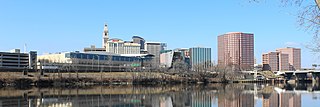
Hartford is the capital city of the U.S. state of Connecticut. It was the seat of Hartford County until Connecticut disbanded county government in 1960. It is the largest city in the Capitol Planning Region, and core city of the Greater Hartford metropolitan area. Census estimates since the 2010 United States census have indicated that Hartford is the fourth-largest city in Connecticut with a 2020 population of 121,054, behind the coastal cities of Bridgeport, New Haven, and Stamford.

Chicopee is a city located on the Connecticut River in Hampden County, Massachusetts, United States. At the 2020 census, the city had a population of 55,560, making it the second-largest city in Western Massachusetts after Springfield. Chicopee is part of the Springfield, Massachusetts Metropolitan Statistical Area. The communities of Chicopee Center (Cabotville), Chicopee Falls, Willimansett, Fairview, Aldenville, Burnett Road, Smith Highlands and Westover are located within the city.

The penny-farthing, also known as a high wheel, high wheeler or ordinary, is an early type of bicycle. It was popular in the 1870s and 1880s, with its large front wheel providing high speeds and comfort.
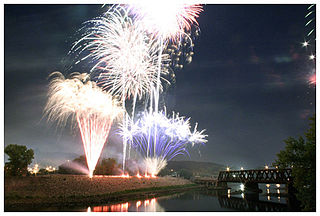
Derby is a city in New Haven County, Connecticut, United States, approximately 8 miles (13 km) west-northwest of New Haven. It is located in southwest Connecticut at the confluence of the Housatonic and Naugatuck rivers. It shares borders with the cities of Ansonia to the north and Shelton to the southwest, and the towns of Orange to the south, Seymour to the northwest, and Woodbridge to the east. The city is part of the Naugatuck Valley Planning Region. The population was 12,325 at the 2020 census. It is the smallest city in Connecticut by area, at 5.3 square miles (14 km2).
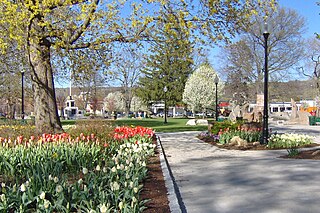
Torrington is the most populated municipality and largest city in Litchfield County, Connecticut and the Northwest Hills Planning Region. It is also the core city of Greater Torrington, one of the largest micropolitan areas in the United States. The city population was 35,515 according to the 2020 census. The city is located roughly 23 miles (37 km) west of Hartford, 34 miles (55 km) southwest of Springfield, Massachusetts, 67 miles (108 km) southeast of Albany, New York, 84 miles (135 km) northeast of New York City, and 127 miles (204 km) west of Boston, Massachusetts.

The bicycle business of the Wright brothers, the Wright Cycle Company successively occupied six different locations in Dayton, Ohio. Orville and Wilbur Wright began their bicycle repair, rental and sales business in 1892, while continuing to operate a print shop. These shops helped them fund their aeronautical studies.

Albert Augustus Pope was a Brevet Lieutenant-Colonel in the Union Army. He was an importer, promoter, and manufacturer of bicycles, and a manufacturer of automobiles.

The Huffy Corporation is a supplier of bicycles with headquarters in Dayton, Ohio, United States.

Nathaniel Wheeler was an American manufacturer and legislator.
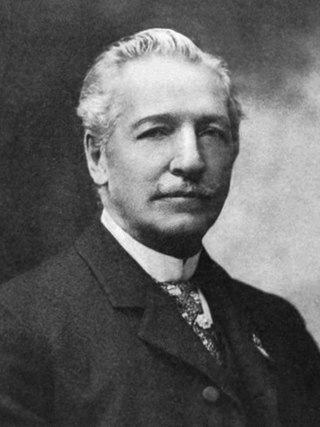
Charles Ethan Billings (1834–1920) was an American mechanical engineer, inventor, superintendent, and businessman. He held various U.S. patents on hand tools, either assigned or licensed to the firm that he and Christopher M. Spencer cofounded, the Billings & Spencer Company. His name as patent holder is stamped on countless forged hand tools, many of which survive. Billings was an expert in drop forging and was an influential leader in the American system of manufacturing and its successor systems of mass production for firearms, sewing machines, hand tools, bicycles, and other goods. He served as president of the American Society of Mechanical Engineers in 1895 and 1896. The Billings & Spencer Company was both a machine tool builder and a manufacturer of hand tools made with its machine tools.
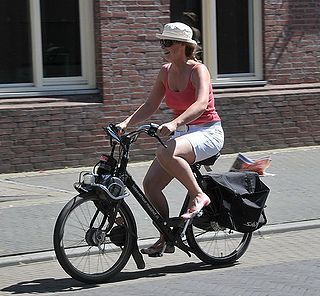
A motorized bicycle is a bicycle with an attached motor or engine and transmission used either to power the vehicle unassisted, or to assist with pedalling. Since it sometimes retains both pedals and a discrete connected drive for rider-powered propulsion, the motorized bicycle is in technical terms a true bicycle, albeit a power-assisted one. Typically they are incapable of speeds above 52 km/h (32 mph).
This timeline of motorized bicycle history is a summary of the major events in the development and use of motorized bicycles and tricycles, which are defined as pedal cycles with motor assistance but which can be powered by pedals alone.
Pope Manufacturing Company was founded by Albert Augustus Pope around 1876 in Boston, Massachusetts, US and incorporated in Hartford, Connecticut in 1877. Manufacturing of bicycles began in 1878 in Hartford at the Weed Sewing Machine Company factory. Pope manufactured bicycles, motorcycles, and automobiles. From 1905 to 1913, Pope gradually consolidated manufacturing to the Westfield Mass plant. The main offices remained in Hartford. It ceased automobile production in 1915 and ceased motorcycle production in 1918. The company subsequently underwent a variety of changes in form, name and product lines through the intervening years. To this day, bicycles continue to be sold under the Columbia brand.

Cedar Hill is a neighborhood in New Haven, Connecticut. It includes portions of the city-designated neighborhoods of East Rock, Quinnipiac Meadows, and Mill River. Cedar Hill was named for cedar trees that were once plentiful there in 1665. The area was divided from the local surroundings by the construction of I-91 in the 1960s. Cedar Hill's boundary runs from James Street, up the Mill River, to Rice Field, over Indian Head Rock, to the Hamden town line, across to Middletown Avenue, to the Eastern side of State Street, back up to James Street.
The history of Connecticut Industry is a major part of the history of Connecticut. Between the birth of the U.S. patent system in 1790 and 1930, Connecticut had more patents issued per capita than any other state; in the 19th century, when the U.S. as a whole was issued one patent per three thousand population, Connecticut inventors were issued one patent for every 700–1000 residents. Connecticut's first recorded invention was a lapidary machine, by Abel Buell of Killingworth, in 1765.
F.I.V. Edoardo Bianchi S.p.A., commonly known as Bianchi is the world's oldest bicycle manufacturing company in existence, having pioneered the use of equal-sized wheels with pneumatic rubber tires. The company was founded in Italy in 1885 and in addition to bicycles it produced motorcycles from 1897 to 1967. In 1955 the joint-venture Autobianchi was created together with Fiat and Pirelli for the manufacturing of cars – Autobianchi was subsequently sold to Fiat in 1969.

The Torrington Company was a firm that developed in Torrington, Connecticut, emerging as a rename from the Excelsior Needle Company. It used a "cold swaging" technique to create sewing machine needles and other needles from cold metal, and was the largest employer in Torrington. in addition to its main facilities in Torrington, it acquired a division, located in South Bend, Indiana.

Frog Hollow is one of the neighborhoods of Hartford, Connecticut. It is a predominantly working-class residential area, bounded on the north by Capitol Avenue, the east by Lafayette Street, the south by Madison and Hamilton Streets, and on the west by Interstate 84. The neighborhood was developed between about 1850 and 1930, and still contains a remarkable concentration of residential housing from that period. The entire neighborhood, covering more than 150 acres (61 ha) and including more than 900 buildings, is listed on the National Register of Historic Places.

Overman Wheel Company was an early bicycle manufacturing company in Chicopee Falls, Massachusetts from 1882 to 1900. It was known for bicycles of higher quality and lower weight than other bicycles of its time. Despite a nationwide bicycle craze in the late 1800s, the company was undercut by lower-priced competition, nearly went bankrupt in 1897, and never recovered from an 1899 fire. The company was sold in 1900.


















